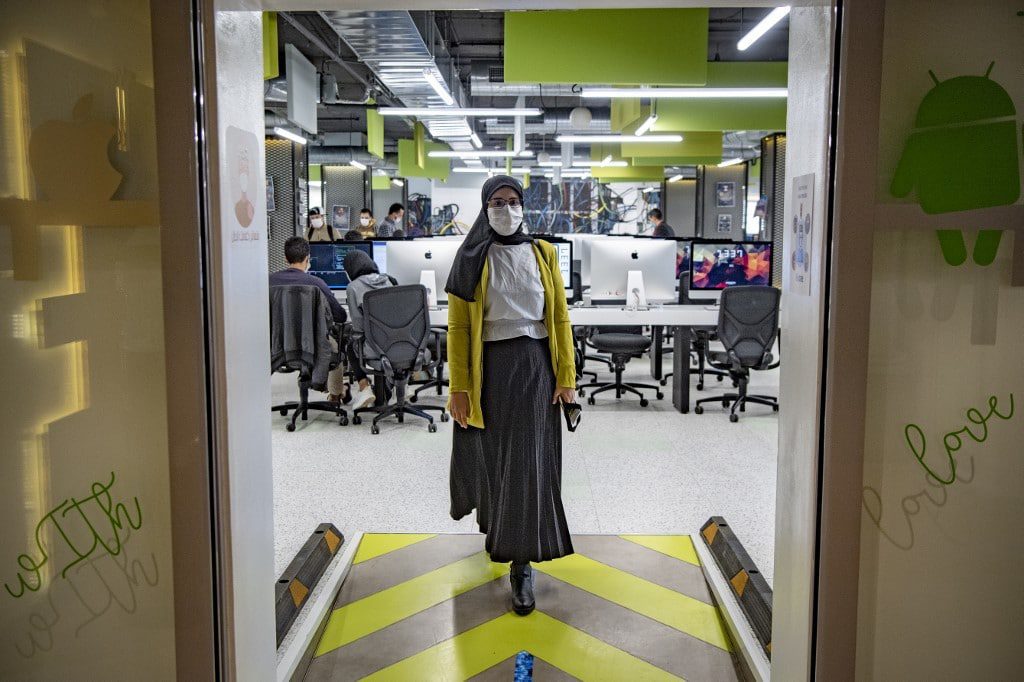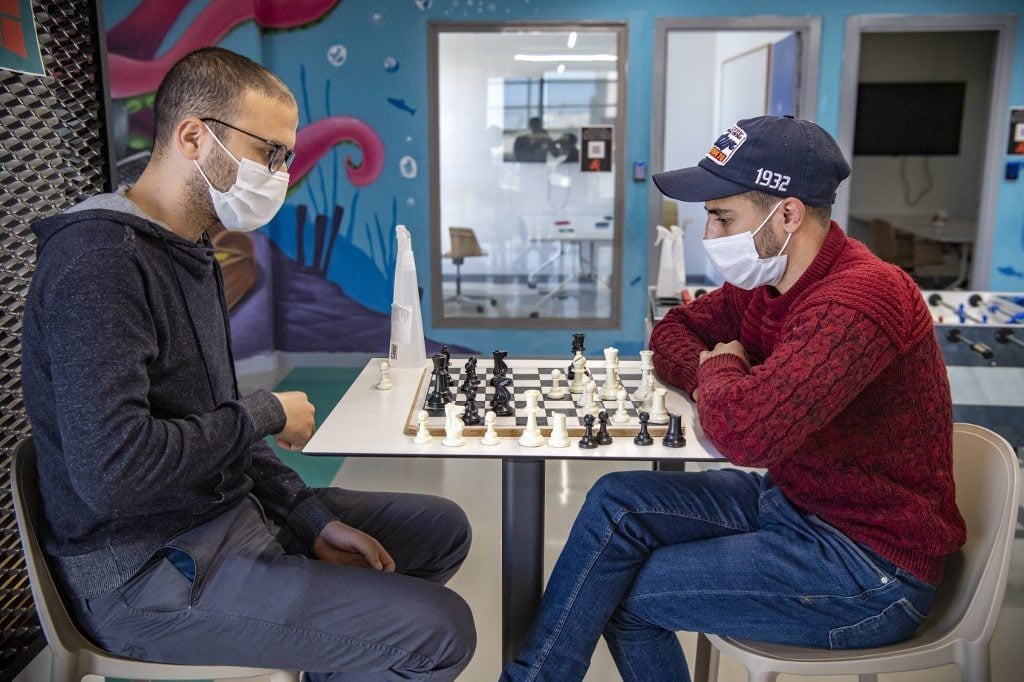
By: Sofia Akram
A new school for tech geeks has opened in Morocco. Only two-years-old, its unique learning style is already gaining attention, which may see it living up to its name — 1337. Non-coders, let me explain.
1337 translates from coding language to read ‘LEET’, or elite, a possible reference to the status of coders set to graduate when the first curriculum officially comes to an end.
The training centre is still in its infancy, set up in 2018 with two campuses so far in Khourigba and Ben Guérir with over 500 students across both.
What makes 1337 a talked about endeavour is its basis on peer learning rather than fixed teaching programmes or schedules. Student learning evolves from problem-solving, gamified projects, and learning from others.
Anyone aged 18-30 is allowed to take the two-hour entrance test, even non-Moroccans, and there are zero fees or prior entrance requirements, including no requisite IT qualifications or knowledge.
On passing the exam, successful students are invited back for a four-weeks immersion known as ‘la piscine’ or swimming pool.
The school is open 24 hours a day, seven days a week, and assessments and graded by peers, so students are trainers as much as they are learners.
Projects are set up in a video game format so ‘players’ collect star points, which are broken down into 17 professional skills, and students can move up levels. The school’s website says it is making IT more fun than the perhaps dry perception it has among the public.
While there is no set time-frame students have to complete the course, there’s an expectation that it takes three to five years, including internships or other professional experience.
The unique school emerged as a partnership between the corporation OCP (Office Chérifien des Phosphates) — a Phosphate mining company — and 42 Network, a tuition-free programming school founded by French billionaire Xavier Niel, which holds the genesis of the 1337’s pedagogy and which has spun from it other schools.
Saad El Yousfi, a 25-year-old Moroccan from Casablanca, is one student who gave the school a try after hearing about the didactics of the 42 Network.
When he saw 1337 was opening in Morocco on a site far from Casablanca, he knew he would sign up.
It is the “learning by doing” ethos that really appeals to El Yousfi; he calls it “learning to learn”.
He said the approach nurtures “bright and innovative people” for the future by guiding them rather than telling them what to do, letting each person find their own solution to the problem.
“We have different minds and different ways to see through things, we learn a lot mostly from our peers”, he told Fanack, “and trust me, we learned in a year what we weren’t able to learn in a five-year traditional pedagogy”.
El Yousfi graduated on 14 December 2020 from the Interactive Digital Centre at the University Mohammed 6 Polytechnique (UM6P). In addition to courses, he says there are opportunities to build on skills, including learning about XR — virtual reality and augmented reality.
“What I like the most about 1337 is that it does not only focus on studies but on entrepreneurship as well”, says El Yousfi, “They help and mentor anyone with an idea to develop it into something concrete”.
After graduating, El Yousfi intends on working on his own project to implement and integrate augmented reality into the traditional education system with a view for “paperless” classrooms in the future.
42 Network already has a good reputation outside Morocco. In 2017, it was ranked the best computer science training program by CodinGame, a programming platform.
The project could come at an opportune time for the North African kingdom.
“The school appears to be aligned with Morocco’s digitalization initiatives, acting as a locomotive to the journey the country is initiating on this critical bet for the future”, said a consultant at Infomineo, a research provider based in Africa and the Middle East.

“1337 is an innovative model that gives young people the opportunity to really find their way, without any formalism, but in trusting their creativity, initiative and determination”, said H.E. Dr Saïd Amzazi, the Moroccan Minister of Education and Scientific Research, commented about the school.
“I was truly impressed by the quality of the team behind this project.”
Demand for computer engineers is outstripping the average annual graduation turntable of around 8,000 in the country, particularly as many seek higher salaries abroad.
Capacity in the existing campus is 1,800 students; the current gender division of existing students is 90 percent male and 10 percent female.
OCP’s vision for the school, however, is part of its strategy to build sustainable cities, which it has been doing for the last century. As detailed in the corporation’s sustainability report, it is now developing sound ecosystems to create long-term value for communities as a whole, created through “a holistic urban design to enable each and every one of us to learn, work, share in a sustainable manner”.
Other incubators or research hubs in the same vein as 1337 include Benguerir Mohammed VI Green City, Green Energy Park and the Health & Care Smart City.
As 1337 has a foreseen three-year curriculum and the first class started in 2018, there are scant results on outcomes right now.
That’s not to say there aren’t any. As well as hackathons, competitions and entrepreneurial endeavours, the school has been involved in the launch of successful mobile applications particularly since the onset of the pandemic. These have included TelmidTICE, an app that helps with distance learning, in collaboration with The Ministry of National Education, Vocational Training, Higher Education and Scientific Research.
It also played a hand with others in the development of Nafas, the first entirely Moroccan developed resuscitation and intensive care ventilator, which utilises cutting edge technology and artificial intelligence.
While it’s apparent the school fosters innovation and ingenuity, it may not be for everyone. Students must adopt a proactive approach and there will be some concepts that don’t come as easy to some as others, which may leave some learners behind their peers. The school spins this as an advantage as students learn at their own pace, and, over the course of time, the pace may even out.
The hard learning environment, the school says, will encourage attendees to “sharpen” their skills, using research, experimentation and defensiveness in one’s own ideas to get to a solution, rather than being spoon-fed how to get there.
“I’m sure there’s no flawless system”, says El Yousfi, explaining that learning by yourself is one of the biggest challenges, and for those who are shy and find it hard working with others, it might be difficult, “But it’s part of the process to challenge yourself and get over them.”
With it already seemingly working well in Morocco and Paris, Armenia, and the US, the question of scalability is already answered by 42 Network who is deploying their learning philosophy in different country contexts.
OCP is also proving it can incorporate training and development into hubs as part of a sustainable city and research ecosystem.
Non-Moroccans are already attending the 1337 school, El Yousfi pointing to his own classmates from Togo, Senegal and the Ivory Coast, and there are plans for more campuses in Morocco.
If success continues along this current trajectory, there may be no reason why any city should be off-limits to the novel coding school.

